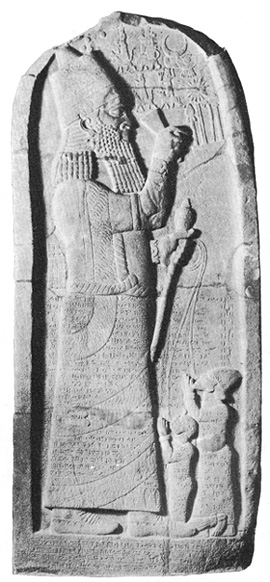

Esarhaddon ruled the Assyrian Empire c. 680-669 B.C. Sennacherib, was assassinated in 681 by two of his older sons while his younger son, Esarhaddon, was in the north with his troops. On hearing of the coup, Esarhaddon led his troops back to the capital and siezed the throne. The 10 ft. 7 in. basalt stela above shows the powerful monarch and two defeated kings tethered in front of him.
From the Prism B, published by R. Campbell Thompson, op. cit.. Translation: ibid., pp. 25 f.
(v 54--vi I) I called up the kings of the country Hatti and (of the region) on the other side of the river (Euphrates) (to wit): Ba'lu, king of Tyre, Manesseh (Me-na-si-i), king of Judah (Ia-ú-di), Quaushgabri, king of Edom, Musuri, king of Moab, Sil-Bel, king of Gaza, Metini, king of Ashkelon, Ikausu, king of Ekron, Milkiashapa, king of Byblos, Matanba'al, king of Arvad, Abiba'al, king of Samsimuruna, Puduil, king of Beth-Ammon, Ahimilki, king of Ashdod--12 kings from the seacoast;
Ekishtura, king of Edi'il (Idalion), Pilagura (Pythogoras), king of Kitrusi (Chytros), Kisu, king of Sillu'ua (Soli), Ihauandar, king of Pappa (Paphos), Erisu, king of Silli, Damasu, king of Kuri (Curium), Atmesu, king of Tamesi, Damusi, king of Qarti-hadasti (Carthage), Unasagusu, king of Lidir (Ledra), Busuru, king of Nuria,--10 kings from Cyprus (Iadnana) amidst the sea,
together 22 kings of Hatti, the seashore and the islands; all these I sent out and made them transport under terrible difficulties, to Nineveh, the town (where I exercise) my rulership, as building material for my palace: big logs, long beams (and) thin boards from cedar and pine trees, products of the Sirara and Lebanon (Lab-na-na) mountains, which had grown for a long time into tall and strong timber, (also) from their quarries (lit.: place of creation) in the mountains, statues of protective deities (lit.: of Lamassû and Shêdu) made of anan-stone, statues of (female) abzaztu, thresholds, slabs of limestone, of anan-stone, of large- and small-grained breccia, of alallu-stone, (and) of gi.rin.hi.li.ba-stone.